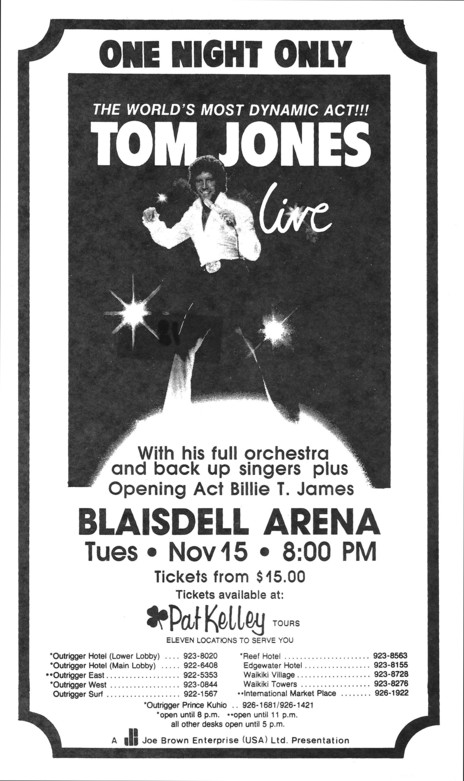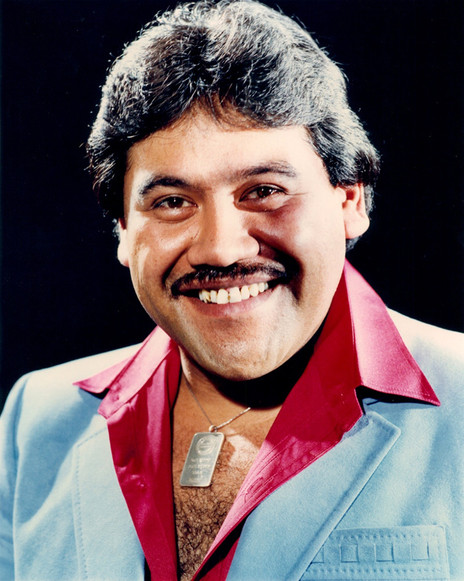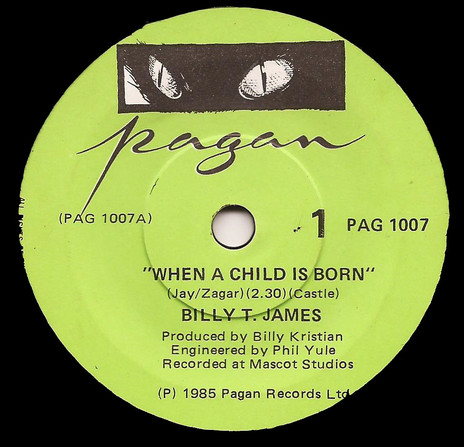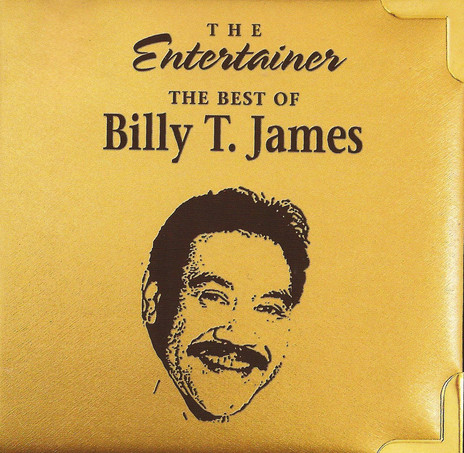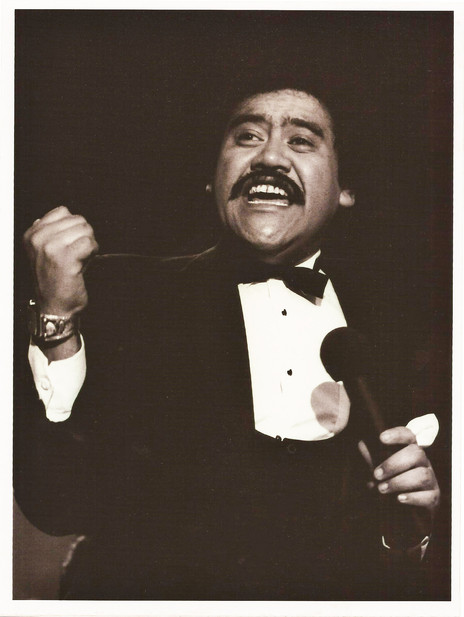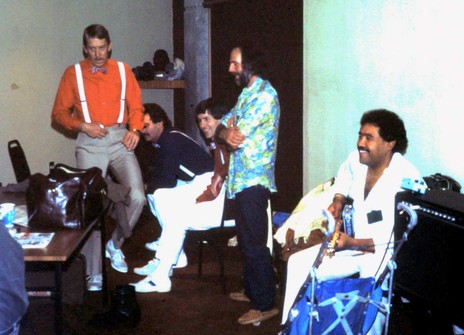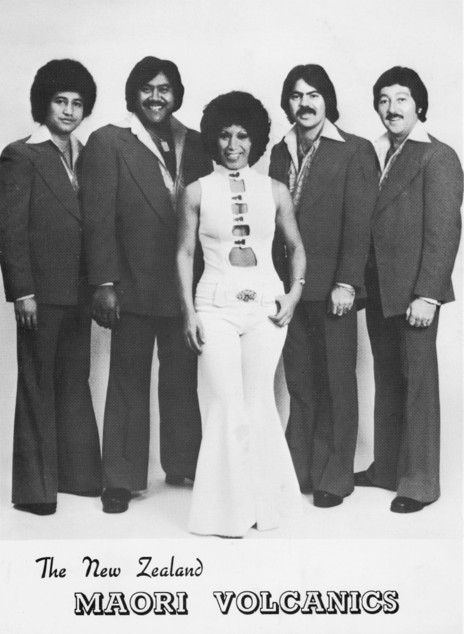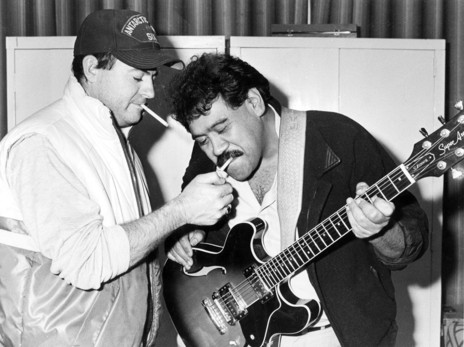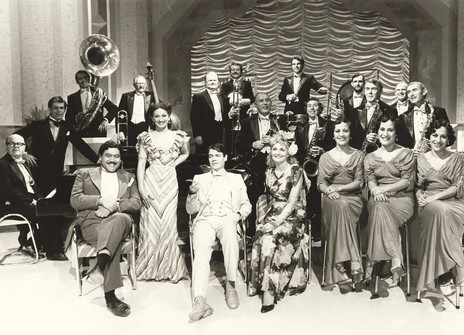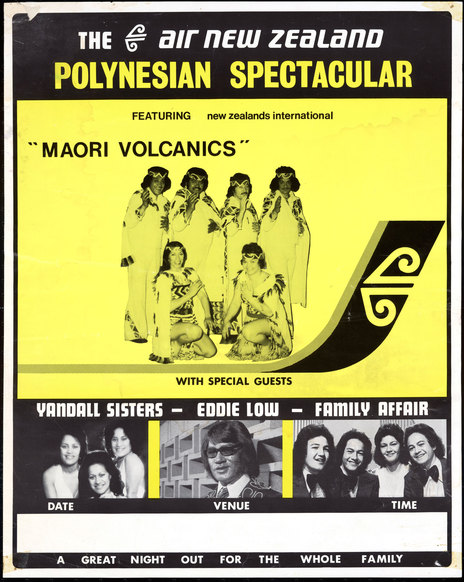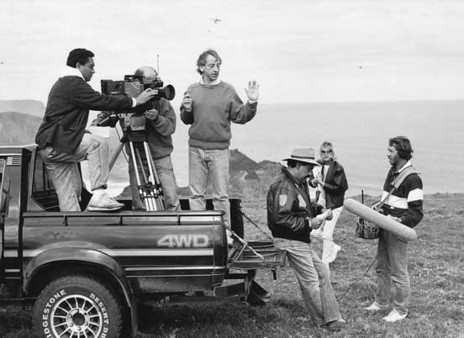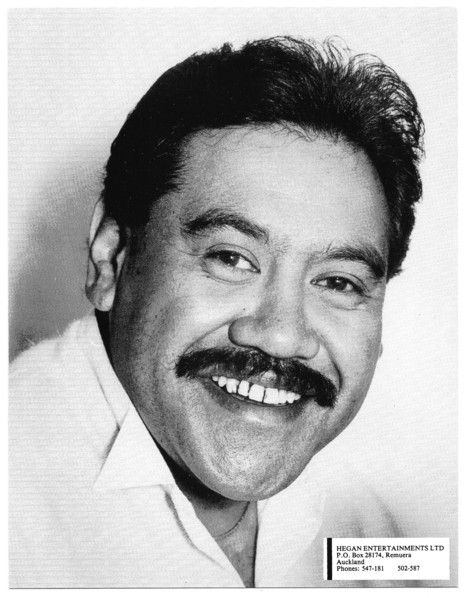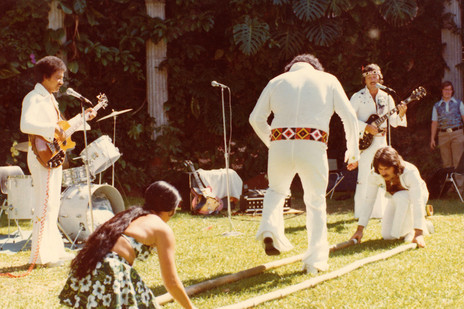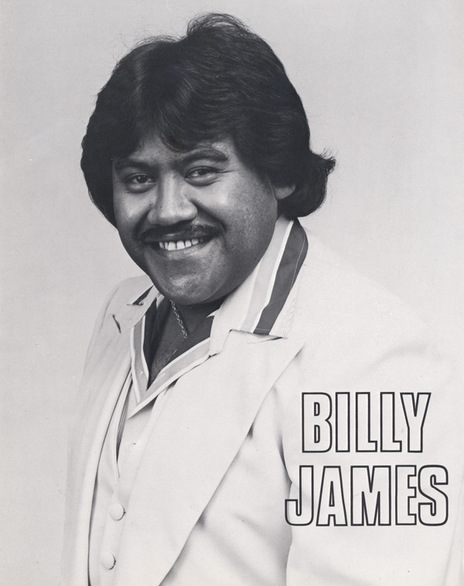While doing his signwriting apprenticeship and living in a Māori boys’ hostel in Auckland, the seeds of Billy the entertainer were starting to sprout. He would play guitar and tell jokes to his roommates well into the night, knowing he would lose his audience if he stopped.
Once he began work, having returned to Whangarei where he had begun to play with bands during his secondary school years, he found like-minded friends (such as singer Mark Williams) who were starting bands or hanging out at Dave Ryan’s central city music store. Billy joined the Quindells, who had a residency at the Station Hotel: first as a saxophonist, then as a guitarist. Even then Billy had a reputation for being able to pick up and play any instrument. Other gigs were plentiful but pay was variable and sometimes only amounted to some fresh, newspaper-wrapped snapper.
Billy returned to Auckland and was hired by promoter Eddie Cook to play with The Radars, a popular group of blind musicians who had a residency at the Gluepot. Another hangout for musos was the Great Northern Hotel, on the corner of Queen and Customs streets. Vocalist Larry Small moved down to Auckland from Whangarei to attend university in 1970 and tracked Billy down to the Great Northern. “At that stage,” recalled Larry, “you wouldn’t have separated Billy from any other talented Māori musician playing in a band.”
Billy, working as a signwriter by day, played with bands such as Tri-Ellis and Princess Puti and Billy before putting together his own groups. First was Black Market, who supported Bunny Walters on a national tour, and later The Georgia Showband. Billy was lead vocals and guitars. Between-song patter from the shy frontman was minimal or heard only by his bandmates.
At the end of 1974, well-established showband The Māori Volcanics, led by Mahora and Billy Peters, were about to embark on a national tour and were in need of a multi-instrumentalist and singer. They approached Mahora’s first cousin, Eddie Cook. He suggested Billy Taitoko and he became part of the travelling band.
A year later The Volcanics spent 10 months in Sydney, following gigs in Tahiti and Rarotonga, and then a year in Europe and Bermuda. In England they played the Bailey’s circuit where their well-choreographed mix of South Seas songs and banter were a hit. According to drummer Dean Ruscoe, “We did a whole segment on Polynesia which went from Cook Islands drumming right through to Māori songs. Then we’d go from that part of the show through to a straight cabaret show with the usual things, like five of us playing ‘Guitar Boogie’ on four guitars.”
More importantly for Billy, who was slowly but successfully incorporating some of his comedy impressions into the show, time in the wings allowed him to see first-hand some of the biggest comedy names of the era, including Tommy Cooper, Les Dawson and Jim Davidson. Comedy magpie that he was, he claimed many jokes as his own or saved them for later use.
Billy went his own way, stopping off in Australia where Prince Tui Teka secured him a number of solo gigs in Queensland.
After the Volcanics returned to New Zealand, Billy went his own way, stopping off in Australia where Prince Tui Teka secured him a number of solo gigs in Queensland. That was the last time Billy Taitoko was seen on stage. A new persona was created: Billy T. James. It was the final cosmetic change to a now-fully formed entertainer.
Mahora Peters says Billy was “a musician all the time before us but he really got his training with us and he always gave us credit for that, which I will always be grateful for. He was lovely to be around. He was one of the best people I ever worked with.”
Back in Auckland, Dean Ruscoe was bandleader at Peter Popovic’s Oliver’s Changing Times nightclub in Fort Street. He gave Billy a plug to Popovic and Billy was booked to try out for an evening. He was a smash hit. Afterwards, Peter Popovic rushed up, quadrupled his fee and signed him up for as many gigs as he could. He knew there was a star in the making. “I’ve never seen anything like it and I’ve worked with some big names,” says Ruscoe. “People were falling on the floor crippled with laughter. They’d never seen anything like it, either. He did that every night and his career was launched.”
A number of booking agents were skeptical that Billy, the reserved singer and guitarist they knew from before his time away with the Volcanics, had the presence or material to be a solo entertainer. Not so Eddie and Elaine Hegan. They put him in one of their performers’ showcases and venue owners fell over themselves to book Billy. The Hegans also arranged for Billy to have singing lessons with tutor Dorothy Hopkins. Apparently she sent him away after one session saying there was nothing wrong with his voice but advised it was best suited to light opera!
Larry Small’s wife Niccy was working for the Hegans and told Larry what content Billy was using in his solo floorshow. “I couldn’t really envisage it,” said Larry. “So we went over to the Glenfield Tavern one night. He was playing with some musos I knew. It was dead flat. About as flat as a pub could be. The crowd were just tolerating the music that was going on. Then out came Billy and I have never laughed so much in my life. I could not believe it, just the timing and everything … and I was someone who knew him. I thought, that’s not the same person! His live audience control was extraordinary.”
The local live entertainment circuit was booming, thanks to the rise of licensed restaurants and cabaret rooms around the North Island such as Titirangi’s Toby Jug, The Forge in Papakura, Ace of Clubs and Trillo’s in central Auckland, Napier’s The Top Hat, Palmerston North’s Southern Cross and Wellington’s Beefeater Arms.
Among the other Hegan acts was television celebrity Ray Woolf. “Billy was very into his music. And so was I,” recalled Ray. “That was our bond, I think, our musical appreciation. We’d check out different clubs for bands we wanted to watch. We were lovers of a lot of great Auckland musicians who probably didn’t get the recognition nationwide that they should have. Billy started using them a lot.”
The music director at Trillo’s was Peter Common, who booked Billy frequently throughout 1980, including as support for the visiting Chubby Checker and shortly after, Gladys Knight and the Pips, who were very impressed with Billy’s talent and persona.
When Billy spent a month gigging in Sydney at RSL and Cosmopolitan Clubs in 1981, he took Peter Commons with him: “We’d go out and do our show and then come back to the Texas Tavern [where they were staying with Billy’s wife, Lynn] and go upstairs to a private bar. Billy would get his guitar out and do George Benson and stuff like that. Small fingers, but he played great.”
His solo show at that time began with Billy – whose musical tastes were very MOR – singing the theme to hit television show The Love Boat. Mid-set, said Peter, “He would sing a number called ‘One In A Million’ which was a great song and Billy used to do it beautifully. He did it dead straight, no comedy, and it was a killer.”
The trip to Sydney did have one unintentional funny moment when Billy and Peter were walking through King’s Cross. “This guy came up to Billy and said, ‘you’re an entertainer’. Billy said, ‘how do you know?’ The guy said, ‘Because all the Māoris up here are either poofs or entertainers and you don’t look like a poof.’ We just cracked up.”
Demand for Billy as a live act increased thanks to his hugely popular television series.
Demand for Billy as a live act increased thanks to his hugely popular television series, and he put together his own backing band, who under the watch of musical director Allan Wade, called themselves The Choice Band. Wade, who had been in the Trillo’s house band, Dealer’s Choice, became a great friend and sidekick to Billy. He recalls, “Billy couldn’t read dots but he could sight read chords. He was a brilliant musician. He was a very tasty guitarist, no question about it. Wonderful style, as a singer as well. We’d start off playing a jazz set while people were dining. Then the next set would be a short one and we’d warm it up a bit. Then Billy would come on and do his show and we’d finish it off with nightclub-type music that people could dance to end the night.”
As for the musical Billy on record or CD, Billy T: The Entertainer was compiled by Glyn Tucker and Gary Daverne and released following his premature death in 1991, aged just 42. Plucked largely from Billy’s 1981 album for Viscount called Selections, the 15 songs (there were also two comedy cuts) prove that he wasn’t always given songs that suited his voice. Some were too fast or in the wrong key. The album of the television show Radio Times, released by Ode in 1980, highlights the strength and range of his voice. The following year’s RCA single ‘Silver Lady’, the B-side to ‘Make the World A Better Place’, gives the listener some idea what Billy’s cabaret floorshow was like at the time. Perhaps the best representation of his voice remains ‘When A Child Is Born’, which was most famously covered by Johnny Mathis in 1976. Billy’s touching 1985 version, released as a single on the Pagan label, was used to promote the Telethon for The International Year of Youth.
A quarter of a century after his passing, Billy T James is remembered as one of the most talented and popular entertainers this country has seen. As he once said, “I can listen to a singer and sometimes a certain note that he or she may sing can give me goosebumps, or maybe a funny feeling down my back and a lump in my throat. If music can do that, it must be good.”
--
Matt Elliott is the author of 11 books including Billy T: the life and times of Billy T James (HarperCollins, Auckland, 2009)
